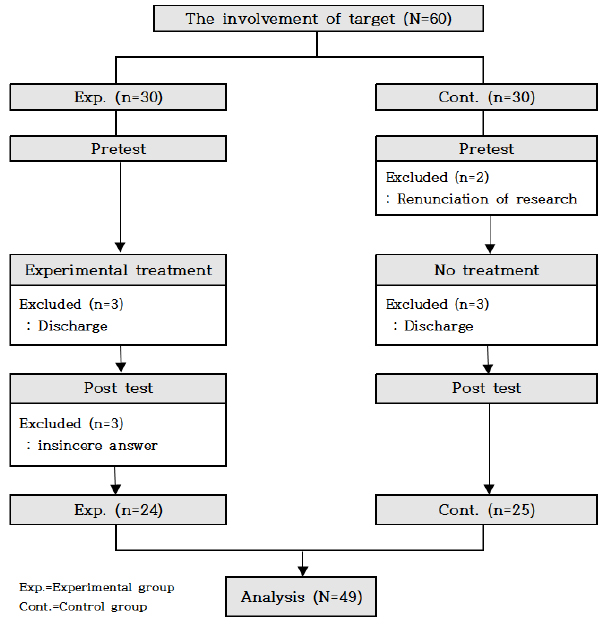J Korean Acad Psychiatr Ment Health Nurs.
2017 Sep;26(3):271-279. 10.12934/jkpmhn.2017.26.3.271.
Mindfulness-based Stress Reduction Program for Psychiatric Inpatients
- Affiliations
-
- 1Graduate School of Advanced Practice Nursing, Eulji University, Daejeon, Korea.
- 2College of Nursing, Eulji University, Daejeon, Korea. icedcoffee@hanmail.net
- KMID: 2392221
- DOI: http://doi.org/10.12934/jkpmhn.2017.26.3.271
Abstract
- PURPOSE
The purpose of this research was to examine the effects of a Mindfulness-based Stress Reduction (MBSR) program on stress response and power in psychiatric inpatients in a closed ward.
METHODS
For this study a quasi-experiment design was used to examine the effects of the intervention. The MBSR program conducted in this study was a six-session program, in which participants were asked to meditate for 45 minutes twice a week for 3 weeks. Homogeneity between the experimental and control group was assessed using χ² test, t-test, and Fisher's exact test. The results of the assessment showed that the variances of the two groups were equal. Demographic variables of the study participants were analyzed using descriptive statistics. The study hypotheses were verified using t-test. Cronbach's α was measured to assess the reliability of each test.
RESULTS
Compared with the control group, patients in the experimental group showed significant improvement in scores for stress response (t=3.62, p=.001) and power (t=-3.42, p=.001).
CONCLUSION
These results suggest that the mindfulness meditation program can be used as a psychosocial rehabilitation intervention for psychiatric inpatients by capitalizing on its positive effects on emotional reactivity and behavioral regulation.
Keyword
Figure
Reference
-
1. Hahm BJ, Jang SJ, Shin YW, Cho SC. Development of Meditation Treatment Program. J Korean Neuropsychiatr Assoc. 2010; 49(6):623–627.2. Jang HK, Kim JM, Bae JH. The development of Korean version of mindfulness-based stress reduction program and the effects of the program. Korean J Health Psychol. 2007; 12(4):833–850. DOI: 10.17315/kjhp.2007.12.4.010.
Article3. Lee HS. The effects of mindfulness meditation on a schizophrenia patient's self-esteem and emotion. J Medit Based Psychol Couns. 2009; 4:146–188.4. Corrigan PW, Watson AC. The paradox of self-stigma and mental illness. Clin Psychol Sci Pract. 2002; 9(1):35–53. DOI: 10.1093/clipsy/9.1.35.
Article5. Choe MH. The effect of stress management program on mental health, coping, and self-esteem of patents with chronic mental illness [master's thesis]. Seoul: Ewha Womans University;2009. 63.6. Barrett EAM. A nursing theory of power for nursing practice: derivation from Rogers' paradigm. In : Riehl J, editor. Conceptual Models for Nursing Practice. 3rd ed. Norwalk CT: Appleton & Lange;1989. p. 502.7. Kim TS, Park JS, Kim MA. The relation of meditation to power and wellbeing. Nurs Sci Q. 2008; 21(1):49–58. DOI: 10.1177/0894318407310777.
Article8. Jang SJ. Effects of meditation program on power, anxiety, depression and quality of life in women with breast cancer. J Korean Acad Psychiatr Ment Health Nurs. 2013; 22(3):205–215. DOI: 10.12934/jkpmhn.2013.22.3.205.
Article9. Lee JH, Kim YM, Choi YM, Lee GC. The effect of meditation on problem solving ability and self-perception. J Korean Neuropsychiatr Assoc. 1997; 36(4):723–731.10. Barbosa P, Raymond G, Zlotnick C, Wilk J, Toomey R, Mitchell J. Mindfulness-based stress reduction training is associated with greater empathy and reduced anxiety for graduate healthcare students. Educ Health (Abingdon). 2013; 26(1):9–14. DOI: 10.4103/1357-6283.112794.
Article11. Kim JE, Kim JH, Kim MRH. The effects of mindfulness meditation on chronic headaches, stress, and negative emotions in high school teachers. Korean J Health Psychol. 2015; 20(1):35–52. DOI: 10.17315/kjhp.2015.20.1.003.
Article12. You SY, Kim JH, Kim MRH. Effects of mindfulness meditation on symptoms of depression, anxiety, stress, and hwa-byung among middle-aged women with Hwa-Byung disorders. Korean J Health Psychol. 2014; 19(1):83–98.
Article13. Yang YP. A systematic review of the mindfulness meditation clinical trials in Korea [dissertation]. Daegu: Daegu Haany University;2010. 103.14. Barrett EAM. Update on a measure of power as knowing participation in change. In : Strickland OL, Dilorio C, editors. Vol. 3.Measurement of nursing outcomes: Self care and coping. New York: Springer;2003. p. 304.15. Barrett EA. Power as knowing participation in change: what's new and what's next. Nurs Sci Q. 2010; 23(1):47–54. DOI: 10.1177/0894318409353797.16. Kim MA. A study on the factors related to learned helplessness of chronic mentally disorder in long-term hospitalization [master's thesis]. Daegu: Kyungpook National University;2005. 21.17. Faul F, Erdfelder E, Buchner A, Lang AG. Statistical power analyses using G*Power 3.1: tests for correlation and regression analyses. Behav Res Methods. 2009; 41(4):1149–1160. DOI: 10.3758/BRM.41.4.1149.
Article18. Kabat Zinn J. Full catastrophe living: Using the wisdom of your body and mind to face stress, pain and illness. New York: Delta Trade Paperbacks;1990. p. 496.19. Matchim Y, Armer JM. Measuring the psychological impact of mindfulness meditation on health among patients with cancer: a literature review. Oncol Nurs Forum. 2007; 34(5):1059–1066. DOI: 10.1188/07.onf.1059-1066.
Article20. Mackenzie CS, Poulin PA, Seidman-Carlson R. A brief mindfulness-based stress reduction intervention for nurses and nurse aides. Appl Nurs Res. 2006; 19(2):105–109. DOI: 10.1016/j.apnr.2005.08.002.
Article21. Koh KB, Park JK, Kim CH. Development of the stress response inventory. J Korean Neuropsychiatr Assoc. 2000; 39(4):707–719. DOI: 10.1097/00006842-200107000-00020.22. Park JM, Choi IR. The effect of K-MBSR program on stress, depression, anger and sleep disorder of middle aged women. J Korean Acad Nurs. 2016; 46(2):194–206. DOI: 10.4040/jkan.2016.46.2.194.
Article23. Kang G, Oh SE. Effects of mindfulness meditation program on perceived stress, ways of coping, and stress response in breast cancer patients. J Korean Acad Nurs. 2012; 42(2):161–170. DOI: 10.4040/jkan.2012.42.2.161.
Article24. Dzurec LC. Schizophrenic clients' experiences of power: using hermeneutic analysis. Image J Nurs Sch. 1994; 26(2):155–160. DOI: 10.1111/j.1547-5069.1994.tb00936.x.
Article25. Praissman S. Mindfulness-based stress reduction: a literature review and clinician's guide. J Am Acad Nurse Pract. 2008; 20(4):212–216. DOI: 10.1111/j.1745-7599.2008.00306.x.
Article
- Full Text Links
- Actions
-
Cited
- CITED
-
- Close
- Share
- Similar articles
-
- Effects of Mindfulness-based Stress Reduction Program on Perceived Stress, Internalized Stigma, and Psychological Well-being in Psychiatric Inpatients
- Diabetes Self-Care and Mindfulness Meditation
- Effects of Mindfulness-Based Therapy on Depressive Disorder
- Mindfulness-Based Interventions for Posttraumatic Stress Disorder
- Women, Stress and Heart Health: Mindfulness-Based Stress Reduction and Cardiovascular Disease


